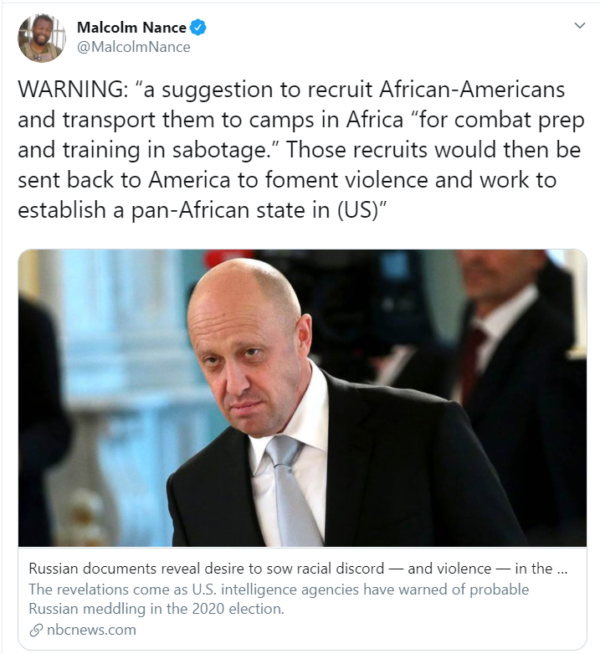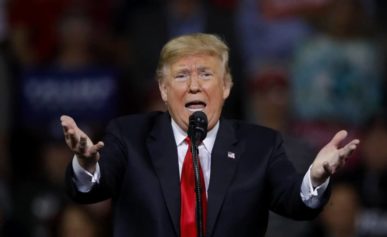With the inaugural Russia-Africa summit that Russian President Vladimir Putin held in Sochi this past week, the former Soviet nation seems poised to reassert its presence in Africa as in past decades, before the fall of the Soviet Union. At issue is what Russia plans to accomplish in Africa this time around, its strategy, and its motivations for once again becoming a player on the mother continent.
In Sochi, Russia, on Oct. 23-24, Putin hosted 50 African leaders, wining and dining them as part of a charm offensive. Russia signed dozens of memoranda of understanding with African nations on issues encompassing energy, military agreements, technology and agriculture.
Landry Signé is David M. Rubenstein Fellow in the Global Economy and Development Program and the Africa Growth Initiative at the Brookings Institution. In an op-ed for Brookings he shared with Atlanta Black Star, Signé argued that Putin is pushing the reset button on Russian engagement with Africa to act as a counterweight to China and the U.S.
“This renewed relationship is going to be centered around pragmatic economic cooperation, military-technical partnerships, and Russia’s quiet soft-power push. These are all set out in the competitive context with the United States, the European Union, and China, among others, as the backdrop,” Signé said. The scholar noted that Russian trade with sub-Saharan African countries has increased from $1.8 billion in 2010 to $4.8 billion in 2018, with Russia playing the role of an exporter. The most recent summit in Sochi is but one of a variety of initiatives and meetings designed to foster better relations between Russia and Africa.
Skeptics argue that Russia wants to project an image of being a superpower through its overtures in Africa, has little to offer Africa other than guns, and has made blunders by viewing Africans as “passive political objects, rather than actors in their own right.”
Arms and military cooperation are a big draw for African leaders, as Russia is the second-largest arms supplier in the world. However, as Foreign Policy noted, a mere 3.7 percent of Russian goods go to Africa, and African products account for a mere 1.1 percent of Russian imports. Nevertheless, W. Gyude Moore, a former Liberian public works minister, told Axios that Russia is able to provide military and diplomatic support, and offers other advantages that overcome Russia’s economic disadvantages compared to China and the U.S.
“If you’re a Nigeria, Burkina Faso, Mozambique, Mali, you’re dealing with insurgencies in your country. And seeing what Russia has done in Syria, maybe it makes sense to have a relationship with Russia on that front,” Moore said. In addition, Moore said, for countries with substantial power problems such as South Africa and Rwanda, Russia offers nuclear power. “If you’re Egypt, the price of bread and cereals is a national security issue. Well, 27 percent of Russia’s exports to Egypt are cereals,” he added.
According to Bakary Sambe, director of the Timbuktu Institute African Center for Peace Studies in Dakar, the Russian emphasis on collaboration as opposed to aid is attractive to African leaders who find the West patronizing. “Africa no longer wants to have all our eggs in one basket,” Sambe told the Washington Post. “We want equal exchanges, as opposed to colonial power relations.”
Russia’s October Revolution of 1917 was an inspiration to African independence movements, who became liberated with financial and military assistance from the USSR and were less motivated by Soviet ideology. The Soviet Union, which had inspired North African liberation movements in its early years, made an impact on sub-Saharan Africa in the second half of the 20th century. In contrast to the anti-Black racism of present-day Russia, the Soviet Union, while no stranger to racism, was ahead of the West in its embrace of African immigration and an official “anti-racist” ideology that capitalized on American discrimination. Thousands of Black people traveled to the Soviet Union in the 1920s and 1930s, and some stayed. This as the USSR was actively involved with African nations and other countries in the Third World, often as a bloody proxy war with the U.S. in Angola, Mozambique and Democratic Republic of Congo (DRC) during the Cold War, and there by invitation in the case of Ethiopia and Somalia in the Horn of Africa.
According to the CIA, Soviet policy towards Africa was to offset Western influence and expand its presence on the continent; promote Soviet military interests as a global superpower; “gain political support from African countries for Soviet undertakings in international forums” and “stimulate changes advantageous to the USSR in African regimes.”
The collapse of the Soviet Union had a substantial effect on Africa. When Soviet troops left Angola in 1991, the African nation rejected Marxism for free market capitalism. Soviet-backed leadership in countries such as Ethiopia and Benin were ousted or voted out of office, while Soviet-educated African government workers and opposition activists lost influence. Further, Soviet weapons proliferated across the continent.
If Russia intends to increase its footprint in Africa in a manner reminiscent of the days of the old Soviet Union — reactivating old ties and forging new bonds with the continent as part of a larger strategy of increasing Russian global influence — it comes at a time of waning American interest in the continent, in which China dominates with $60 billion in pledged investment last year. Moreover, Russian plans for Africa extend beyond trade, investment, development, arms and diplomatic relations to include meddling in African politics and elections via social media. In advance of the 2020 elections in the U.S., Russia is using Facebook to wage a disinformation campaign in Africa. Facebook said it removed 66 accounts, 83 pages, 11 groups and 12 Instagram accounts that were related to the campaign and had followings of hundreds of thousands of users.
The Russian figure behind the Africa campaign, Yevgeny Prigozhin, is a Russian oligarch connected to the Kremlin. In the U.S., special counsel Robert Mueller indicted Prigozhin for his role in financing the Internet Research Agency, a Russian troll factory whose social media campaigns attempted to influence the U.S. 2016 and 2018 elections.
“While the presence of Russian military instructors and paramilitary groups in Libya and the Central African Republic is well documented, there is emerging evidence that Russian-linked companies are now active in the information space as well. Yevgeny Prigozhin, the oligarch perhaps best known for running the Internet Research Agency, is central to this expansion,” according to a report from Stanford University.
The countries the campaign targeted include Libya, the Central African Republic, the Democratic Republic of the Congo, Madagascar, Mozambique, and Sudan, and included “news” pages and websites claiming to belong to individual politicians and political parties. Posts criticized the presence of the U.S. and France in Africa, and praised Russian deals for African natural resources such as gold and diamonds. One Facebook page pretended to be a Sudanese news network called Sudan Daily and reposted articles from the Russian news outlet Sputnik. In October 2019 alone, the pages were responsible for 8,900 posts. By comparison, in 2016, Russian online disinformation efforts posted in the U.S. an average of 2,442 times a month in 2016. According to Facebook, this is the first documented case of Russia outsourcing a disinformation effort to local actors, which was employed to hide the real origins of these pages. Facebook noted that the Russian operation used nearly 200 fraudulent accounts and reached over 1 million Africans.
Earlier this year, leaked documents revealed Prigozhin’s plans to build a Russian presence in 13 African nations by “building relations with existing rulers, striking military deals, and grooming a new generation of ‘leaders’ and undercover ‘agents,’” as The Guardian reported. Russia has a military base in Central African Republic, which allows Russian expansion into the continent, and its companies to profit from the region’s mineral wealth.

Prigozhin also devised a plan to “manipulate and radicalize African Americans” as part of a greater plan to sow racial conflict and destabilize the U.S. The plan, called “Development Strategy of a Pan-African State on U.S. Territory,” proposed recruiting low-income, formerly incarcerated and radical Black people from America and sending them to camps in Africa “for combat prep and training in sabotage.” Under the plan, these recruits would return to the U.S. to foment violence and establish a pan-African state in South Carolina, Georgia, Alabama, Mississippi and Louisiana.
Apparently, Russia has a lot of plans for Africa that go far beyond trade.


